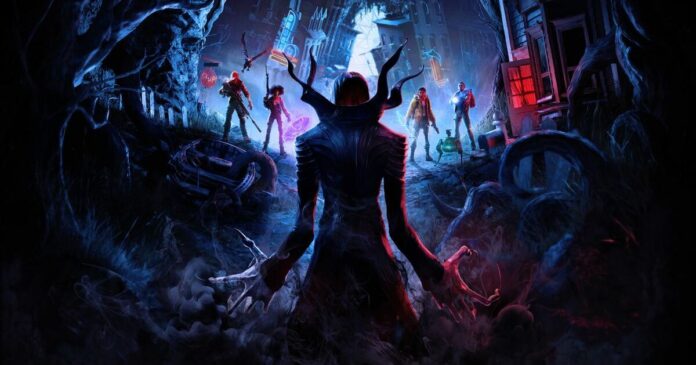Redfall is a silly game about shooting vampires, but also not. Yes, it’s about clearing a town of a supernatural nuisance using flashy powers and souped up weaponry – and there’s much more on how it plays in Aoife’s video below – but, just as with Arkane’s previous series Dishonored, there’s also much more going on beneath the surface.
After time with the game myself, I was surprised to find Redfall’s combat pitted my character against actual living, breathing humans just as often as the undead. Two human factions stand out: true-believer cultists who have thrown their lot in with the vampires as our new gods, and then members of Bellweather, a Blackwater-style private military contractor. These groups help keep combat varied, and offer a somewhat easier experience than the game’s fast-moving recently-deceased. In Redfall, vampires can zoom up and quickly swarm you, and require not just bullets but also a final stake to put back in the grave.
Perhaps more interesting, however, are the reasons why any of these groups are enemies at all – and it’s down to the way Redfall’s world has been brought to life by creator Harvey Smith, designer of Deus Ex and creative director of both Dishonored and its sequel. As a recent story trailer for Redfall makes clear, this game’s brand of bloodsuckers were born from the capitalistic vampirism of Aveum Therapeutics, a money-minded Big Pharma corp left to experiment unchecked. Its schemes gone awry led to the New England town being taken over by actual vampires (as well as those two human factions seeking to profit from the undead’s presence).
“The thematics are that the [richest] 0.1 percent are already vampires,” Smith tells me. “And in this game, they literally become vampires.” Our conversation comes after I’ve played an early mission in the game which culminates at the Addison Mansion, a creepy house previously home to one of Aveum Therapeutics’ founders, whose DNA experimentation led him to believe he was some kind of god. (If you’ve seen the brilliant mini-series Dopesick, which focuses on the real-life exploits of the Sackler family, there are interesting parallels here to Purdue Pharma.)
“Our fiction was never a disease metaphor. It was always elective.”
“Our fiction was never a disease metaphor,” Smith continues, describing those who either have become vampires or ended up as cultists worshipping them. “It was always elective, it’s not like a zombie outbreak where I accidentally gave you vampirism. You have to decide. So, [Smith points at me] if you’re a vampire, and I want to be a vampire, I’m probably begging you. And you’re probably like, ‘Bring me your neighbour’s kids’. And I bring you my neighbour’s kid [in exchange]. That’s literally our fiction.”
It’s a fiction which reflects the reality in which Redfall was made, Smith suggests, during a tumultuous time in world events which saw great changes in US and UK politics, as well as numerous cases of rich megacorps taking advantage of people as the real world turned to hell. “You’re fighting private military contractors, and people who used to be your dentist or your baker or a cop who have decided to throw in with the new masters,” Smith acknowledges. Meanwhile, the game has players use “public buildings for where you’re fighting back from, like a fire station and the maritime centre” as resistance hubs.
“Twice on this project, Austin has lost power and water,” Smith says, reflecting on his life back at Arkane Studios in Texas. “We had no power for 10 days and had to boil our water. Another time recently we lost power for four days. People died. No power for five or 10 days means old people, poor people, people at the edge of society, they can die. We keep undermining the infrastructure so the rich have it very good, and everybody else has it worse and worse. It’s terrible. And meanwhile, you have guys yelling on the street, like, ‘go home’ and ‘go back to where you’re from’. I think all of that was in my head.”
Smith recalls completing work on Dishonored 2 at Arkane Lyon and living in Europe during a period where the UK voted for Brexit, right before the US voted for Donald Trump. “I woke up in the middle of the night,” Smith says of the US election, “I was on Twitter and I was just watching my friends be like, ‘What the fuck is happening?’ There was just this crestfallen, defeated, kind of reaction. And that’s when I felt it: ‘This signals the beginning of something really wild.’ This is populism. This is like echoes of earlier times in history.” And while all of this goes on in the background, he continues, numerous “horror show” incidents have taken place involving pharmaceutical companies.
“It’s on my mind a lot. But I make video games. So what do I do?”
Smith lists scandals such as the Theranos blood analysis tool made by former entrepreneur and now convicted fraudster Elizabeth Holmes, the conviction of “Pharma bro” Martin Shkreli who jacked up the price of much-needed medication, and the downfall of the billionaire Sackler family who made a fortune “on the backs of the oxycontin epidemic”. “It’s on my mind a lot,” Smith continues, taking a breath. “But I make video games. So what do I do?”
Well, one option is to reflect the world in a video game about vampires, to show people how fucked up everything’s become.
“The question is, is that just annoying to the people that don’t care?” Smith replies. “Or don’t want that around? Is it interesting at all, to the people who do? Because at the end of the day, you’re shooting vampires. Is it the worst of both worlds? It worked out with Dishonoured and Deus Ex, but obviously sometimes it doesn’t work out.”
The game’s cast reflects Redfall’s desire to show characters with meaningful backstories, and depict a group of survivors who might have real reasons for fighting back. There’s Layla, a medical student stuck in debt who volunteered for an Aveum clinical trial which went wrong. She has an umbrella-like shield which can be upgraded to deal damage back, the ability to briefly lift herself high in the air to access hard-to-reach spots, and can call on her “himbo ex-boyfriend Jason” – a vampire – who will turn up to help.
There’s also Jacob, a former member of Bellweather who is now estranged from the group. He now has a vampire eye, for reasons, which lets him scout using a ghostly raven. He also has a high-tech invisibility cloak and a souped up sniper rifle. Remi was part of a search-and-rescue squad and acts as a tech specialist, with a robot that can attract and aggro enemies. The last of the quartet is Devinder, a YouTube influencer who believes in the supernatural, who sees the rise of vampires as an opportunity. He has a blacklight device to stun vampires, arc javelins to zap them, and a translocator to warp places akin to Corvo’s Blink.
The game has changed a bit over the years, Smith says, but despite everything that has happened in the world since its inception, Redfall remains very much the game he always intended to make. “It’s the same way Deus Ex is a fun action game, atmospheric and cyberpunk – but the very concept of Cyberpunk is political,” he argues. “Dishonoured is aristocrats making a profit during the plague. You can play this game as a fun spooky action game where Laila’s like, ‘I hope they cancelled my student debt! Boom!’ But if you read more deeply into it, the founders of Aveum therapeutics were already vampires. Monsters are always metaphors.
“Most of the time, this is just a spooky action game,” Smith concludes. “And it’s a deep dive into a New England town we made up and the lives of the people there. You can infer from environmental storytelling who lived there and what life was like, before this hot startup came in and started gentrifying the area and warping reality around them – figuratively and literally. Most of the time, that’s what the game is about.”
As part of the same conversation, Smith revealed to Eurogamer that Arkane was working to U-turn on Redfall’s single-player always online restriction, which you can read about here.
www.eurogamer.net







